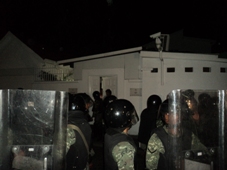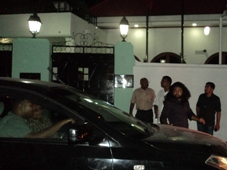Stone-walling and deflecting one issue with another have been tested methods of political strategy and administrative tactic in ‘matured’ democracies elsewhere. The young Maldivian democracy seems to have fast-tracked the processes and fine-tuned the methodology, and as a result these two aspects alone have remained three years after the nation heralded multi-party democracy and a directly-elected President in a hotly-contested campaign.
The latest in the series is the arrest of Chief Justice of the Criminal Court, Abdullah Mohammed, and the involvement of the Maldivian National Defence Force (MNDF) in executing the request of the police in this regard. Allegations have remained against the judge since the days of the predecessor Government of President Maumoon Gayoom, but his arrest, the involvement of the nation’s armed forces and the subsequent non-compliance of the orders of the civil court and the High Court in the matter, have all raised serious questions about the future of democracy in the country.
The last time, the Government of President Mohammed Nasheed employed the MNDF likewise was in mid-2010. At the time, the MNDF shut down the nation’s Supreme Court, under his orders, following a constitutional deadlock over the inability of the Executive and Oppositions-majority Parliament to pass required legislation on a variety of subjects, under the new Constitution, before the deadline had passed. Saner counsel (particularly low-profile Indian efforts) prevailed and the deadlock was resolved at the time.
Now, as then, ruling Maldivian Democratic Party (MDP) leaders, starting with President Nasheed, have called for ‘judicial reforms’. They have also reiterated the request from 2010, for the UN to help the nation introduce new canons of law and judicial practices. There is truth in the Government claims that most of the 170-odd judicial officers across the country were not qualified in law. As was known at the time of the 2010 crisis, only around 30 of all judicial officers in the country had a university degree in law.
As was again explained at the time, in a country where education stopped at A-Level (Cambridge, to be precise) for most, lawyers, and law and judicial officers with university degrees are hard to come by. Qualified lawyers in Maldives, as has been the wont in most other democracies and for historic reasons, either prefer private practice with a corporate clientele, or politics, or both. Yet, it is often argued, that the rest of the 170-plus were qualified in the Islamic Sharia. It is this that the present regime wanted to rewrite. Inherent to the effort is also the belief that most judges, having been appointed by the previous regime and without formal qualifications, tended to be loyal more to the erstwhile rulers than to the present Government and/or the Constitution.
Rallying cause for the Opposition
Independent of the merits involved in Judge Abdullah’s arrest, it has provided a rallying cause for the Opposition, after the hugely-successful December 23 protest to ‘protect Islam’. In between came the arrest of an Opposition leader, Dr Mohammed Jameel, Vice-President of the Dhivehi Qaumee Party (DQP) of Dr Hassan Saeed, one-time Presidential Advisor to incumbent Nasheed and Attorney-General to predecessor Gayoom. The arrest of the otherwise controversial judge, against whom the first charges were laid by Hassan Saeed as Attorney-General as far back as 2005, has seen that the ‘December 23 movement’, launched by non-political NGOs, now consolidating itself into a political front.
With Judge Abdulla’s arrest, the divided opposition that had joined the ‘protect Islam’ rally under the care of religion-based NGOs, have taken over the leadership of the movement, if the latter still claims to be apolitical with a single-point agenda. This may also lend credence to the Government’s argument that the ‘protect Islam’ movement, based on the installation of individual monuments by SAARC member-countries after the Addu Summit in November, was more political and less religious in form and content. In popular perception, that may not be saying a lot, as one after the other, the issues that the Government seems wanting to offer the Opposition, has only helped the latter to sink their differences even more and consolidate their unity, which prior to December 23 protest was not seen as being possible, particularly during the run-up to the 2013 presidential polls.
The controversy surrounding the SAARC monuments, starting with that of ‘Islamic Pakistan’, being idolatrous in nature, may have robbed much of the credit that the Maldivian Government and President Nasheed richly deserved. MDP leaders are not tired of claiming that it was all part of a larger political conspiracy, aimed at upsetting President Nasheed’s growing popularity during the long run-up to the 2013 polls. Conversely, the divided Opposition of the time was arguing that the Government was deliberately flagging religious issues that went beyond the SAARC monuments, if only to ensure that President Nasheed got a party and challenger of his choice in the polls which they were convinced would go into the second, run-off round.
The issues included clearance for liquor sale in a newly-built star-hotel in the national capital of Male, proposals for allowing liquor sale in uninhabited parts of otherwise inhabited islands, both going against existing laws, and the demolition of an Islamic school, again in Male. Neither the pro-Islam NGOs, nor the opposition could have divined the ‘SAARC monuments’ controversy, but when it presented itself, they were not the ones to lag behind. Today, the December 23 rally is being projected as the largest gathering of the type in the country – with most partnering outfits in the erstwhile ‘pro-democratic’ movement of the earlier years having switched sides, since.
Role of the Vice-President
A new dimension has been added to the current crisis with the Opposition leaders and other partners in the December 23 movement calling on Vice-President Mohammed Waheed Hassan. Though it has been a practice for Maldivian political class to hold their public rallies and have their consultations post-dinner time and possibly going beyond 2 am, the urgency with which they called on the Vice-President at 1 am did not go unnoticed. The country’s first PhD-holder (from Stanford University), Waheed has resisted the MDP’s persuasive efforts to merge his GaumeeIththihad Party (GIP, or National Unity Party) with the major electoral partner, for him to be considered for the running-mate of President Nasheed again in 2013. Quiet in temperament, this former UN/UNICEF executive did not take kindly to the MDP later wooing away his senior Cabinet colleagues to its side.
At the end of the meeting with the Vice-President, the interim leader of Gayoom’s newly-floated Progressive Party of Maldives (PPM), the controversial Ummer Naseer, told the local media that they had decided to “pledge support to the Vice-President.” Quoting Naseer, local media reports said, “Dr Waheed assured the party leaders that he would “take any legal responsibility he had to within the bounds of the law and was “ready to take over the duties specified in the Constitution.” In an even more significant observation, Naseer was quoted thus: “After these discussions we are now calling upon the nation’s security forces, on behalf of our ‘December 23 Alliance’ of all the Opposition parties in the country as well as the NGO coalition, to immediately pledge their allegiance to the Vice-President.”The stand of the ‘December 23 alliance’ was that President Mohamed Nasheed has “lost his legal status”, the media quoted Naseer as saying further.
The President’s camp did not seem overly or overtly perturbed by the development. President Nasheed’s Press Secretary Mohamed Zuhair was quoted by the media that the Vice-President “has not said anything to cause a loss of confidence in him by the Government. “He was very careful in his statement, which was that he would undertake his duties as stipulated in the Constitution. Had the protesters gone to meet with (Fisheries Minister and MDP president) Dr Ibrahim Didi or (MDP parliamentary party leader) Reeko Moosa they would have said the same thing,” Zubair said.
The protesters claimed to represent 13 political parties and 21 NGOs, Zuhair said, “but all the rallies have seen the involvement of no more than 300-400 people. It is very disproportionate”. According to him, “The protests are slowing down and now they are trying to save face – pledging allegiance to the Vice-President is the same as pledging allegiance to the government. The VP is working in Cabinet today – there is no rift. This is a non-story,” Zubair maintained. The government was not concerned about Dr Waheed’s late night meeting with Opposition leaders, as letting the protesters into his house “was the polite thing to do,” Zuhair said. He also dismissed Opposition claims that there was anti-Government sentiment brewing in the security forces.
As in most democracies, the President – and by extension, the Vice-President, can be removed from office only through an impeachment motion in Parliament, with two-thirds of the members voting in favour. In a People’s Majlis with 77 members, the figure comes to 51. Neither the ruling party, nor the opposition (combine) has the number, and both have been falling back on the Independents to add up the numbers for obtaining a simple majority for their legislative initiatives, from time to time. Like the US pattern, the Maldivian scheme does not provide for fresh elections in case the presidency fell vacant mid-term. The Vice-President steps in, instead, to complete the unfinished term.
At the height of the ‘constitutional crisis’ triggered by the Government, entailing the en masse resignation of the entire Cabinet in mid-2010, Vice-President Waheed, would not comply with the MDP initiative, for him to quit, too. Owing to Vice-President Waheed’s considered stand, the Executive could not proceed with a politico-electoral showdown with the Opposition-majority Parliament, particularly over their criticism of the GMR contract for the modernisation of the Male International Airport, involving the Indian infrastructure major.
The Opposition, going by sections of the local media, has twisted President Nasheed’s alleged statement that he would not go in for fresh elections until he had ‘reformed’ the judiciary. The observation was contained in a leaked tape, which was broadcast by sections of the local media, and is purported to be contained in a conversation with the MNDF. The Opposition has interpreted this to argue that President Nasheed had no intention of holding elections, when due, by arguing that the promised judicial reforms were not yet over. It was also the reason for their mid-night meeting with Vice-President Waheed.
A surprising element in the current controversy is the unexpected criticism of the Government’s action by Dhiyana Sayeed, the Maldivian Secretary-General of SAARC since the Addu Summit in November. A nominee of the Nasheed leadership for the top job in the SAARC, which is as rotational as the SAARC Chair, the first woman Secretary-General of SAARC promptly put in her papers, as the SAARC Charter specifically prohibits the organisation from interfering in the internal affairs of member-countries. In between, she had also courted arrest for a brief while along with the ‘December 23 movement’ leaders, protesting Judge Abdullah’s arrest. Though not very well known nearer home or overseas, given in particular, her short stint at SAARC, the former Attorney-General has still stirred the net, nonetheless.
The writer is a Senior Fellow at the Observer Research Foundation.
All comment pieces are the sole view of the author and do not reflect the editorial policy of Minivan News. If you would like to write an opinion piece, please send proposals to [email protected]

